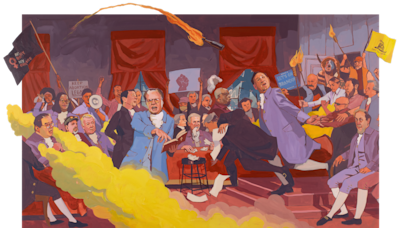Search results
Nine Justices make up the current Supreme Court: one Chief Justice and eight Associate Justices. The Honorable John G. Roberts, Jr., is the 17th Chief Justice of the United States, and there have been 104 Associate Justices in the Court’s history.
- Current Members
He became a Judge of the United States Court of Appeals for...
- Justices 1789 to Present
The date a Member of the Court took his/her Judicial oath...
- About The Court
The Court is the highest tribunal in the Nation for all...
- The Supreme Court Building
The Supreme Court Building, located at One First Street, NE,...
- Supreme Court at Work
The Term of the Court begins, by law, on the first Monday in...
- Docket Search
Users can search for the docket in a particular case by...
- Case Documents
The Court regularly issues orders in connection with cases....
- History and Traditions
Established by the United States Constitution, the Supreme...
- Building Regulations
REGULATION TWO. In order to protect the Supreme Court...
- Visiting The Court
The Supreme Court Building, majestic in size and rich in...
- Current Members
The court consists of nine justices: the chief justice of the United States and eight associate justices, and the justices meet at the Supreme Court Building in Washington, D.C. Justices have lifetime tenure, meaning they remain on the court until they die, retire, resign, or are impeached and removed from office.
People also ask
Who is a member of the Supreme Court?
How many Supreme Court justices are there?
What does equal justice under law mean?
What is the courtroom of the Supreme Court?
The Court is the highest tribunal in the Nation for all cases and controversies arising under the Constitution or the laws of the United States. As the final arbiter of the law, the Court is charged with ensuring the American people the promise of equal justice under law and, thereby, also functions as guardian and interpreter of the Constitution.
- Supreme Court Background
- The Justices
- The Court's Jurisdiction
- Cases
- Judicial Review
- Role
- Impact
Article III of the Constitution establishes the federal judiciary. Article III, Section I states that "The judicial Power of the United States, shall be vested in one supreme Court, and in such inferior Courts as the Congress may from time to time ordain and establish." Although the Constitution establishes the Supreme Court, it permits Congress to...
Over the years, various Acts of Congress have altered the number of seats on the Supreme Court, from a low of five to a high of 10. Shortly after the Civil War, the number of seats on the Court was fixed at nine. Today, there is one Chief Justice and eight Associate Justices of the United States Supreme Court. Like all federal judges, justices are ...
Article III, Section II of the Constitution establishes the jurisdiction (legal ability to hear a case) of the Supreme Court. The Court has original jurisdiction (a case is tried before the Court) over certain cases, e.g., suits between two or more states and/or cases involving ambassadors and other public ministers. The Court has appellate jurisdi...
When exercising its appellate jurisdiction, the Court, with a few exceptions, does not have to hear a case. The Certiorari Act of 1925 gives the Court the discretion to decide whether or not to do so. In a petition for a writ of certiorari, a party asks the Court to review its case. The Supreme Court agrees to hear about 100-150 of the more than 7,...
The best-known power of the Supreme Court is judicial review, or the ability of the Court to declare a Legislative or Executive act in violation of the Constitution, is not found within the text of the Constitution itself. The Court established this doctrine in the case of Marbury v. Madison (1803). In this case, the Court had to decide whether an ...
The Supreme Court plays a very important role in our constitutional system of government. First, as the highest court in the land, it is the court of last resort for those looking for justice. Second, due to its power of judicial review, it plays an essential role in ensuring that each branch of government recognizes the limits of its own power. Th...
The decisions of the Supreme Court have an important impact on society at large, not just on lawyers and judges. The decisions of the Court have a profound impact on high school students. In fact, several landmark cases decided by the Court have involved students, e.g., Tinker v. Des Moines Independent School District (1969) held that students coul...
The Justices of the Supreme Court are most likely to take cases that will affect the entire country, not just the individuals involved.
Oct 24, 2012 · The date a Member of the Court took his/her Judicial oath (the Judiciary Act provided “That the Justices of the Supreme Court, and the district judges, before they proceed to execute the duties of their respective offices, shall take the following oath . . . ”) is here used as the date of the beginning of his/her service, for until that ...


